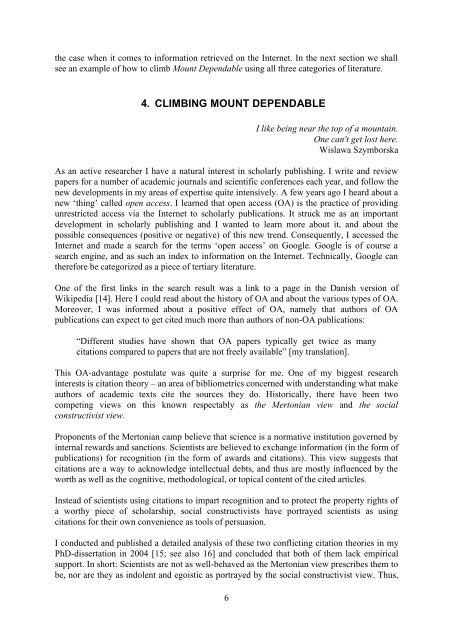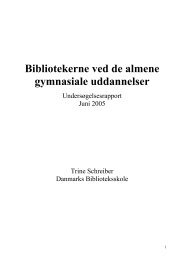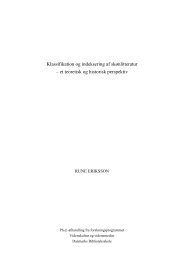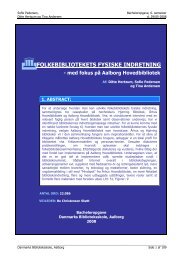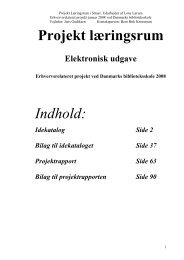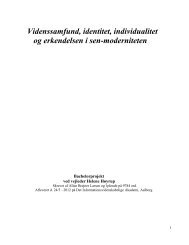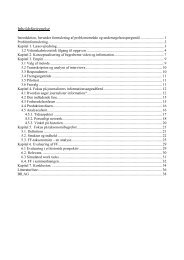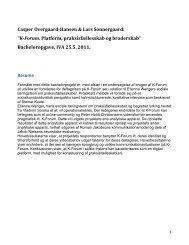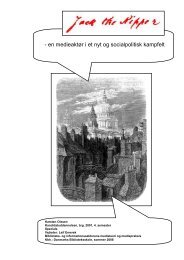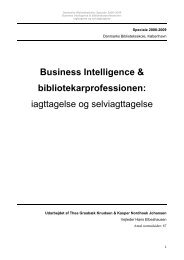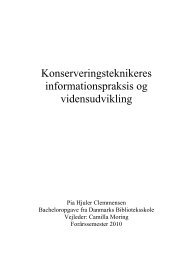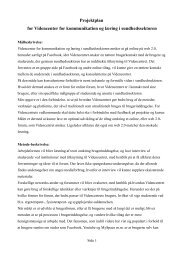how to detect misinformation on the internet
how to detect misinformation on the internet
how to detect misinformation on the internet
You also want an ePaper? Increase the reach of your titles
YUMPU automatically turns print PDFs into web optimized ePapers that Google loves.
<strong>the</strong> case when it comes <str<strong>on</strong>g>to</str<strong>on</strong>g> informati<strong>on</strong> retrieved <strong>on</strong> <strong>the</strong> Internet. In <strong>the</strong> next secti<strong>on</strong> we shall<br />
see an example of <str<strong>on</strong>g>how</str<strong>on</strong>g> <str<strong>on</strong>g>to</str<strong>on</strong>g> climb Mount Dependable using all three categories of literature.<br />
4. CLIMBING MOUNT DEPENDABLE<br />
6<br />
I like being near <strong>the</strong> <str<strong>on</strong>g>to</str<strong>on</strong>g>p of a mountain.<br />
One can't get lost here.<br />
Wislawa Szymborska<br />
As an active researcher I have a natural interest in scholarly publishing. I write and review<br />
papers for a number of academic journals and scientific c<strong>on</strong>ferences each year, and follow <strong>the</strong><br />
new developments in my areas of expertise quite intensively. A few years ago I heard about a<br />
new ‘thing’ called open access. I learned that open access (OA) is <strong>the</strong> practice of providing<br />
unrestricted access via <strong>the</strong> Internet <str<strong>on</strong>g>to</str<strong>on</strong>g> scholarly publicati<strong>on</strong>s. It struck me as an important<br />
development in scholarly publishing and I wanted <str<strong>on</strong>g>to</str<strong>on</strong>g> learn more about it, and about <strong>the</strong><br />
possible c<strong>on</strong>sequences (positive or negative) of this new trend. C<strong>on</strong>sequently, I accessed <strong>the</strong><br />
Internet and made a search for <strong>the</strong> terms ‘open access’ <strong>on</strong> Google. Google is of course a<br />
search engine, and as such an index <str<strong>on</strong>g>to</str<strong>on</strong>g> informati<strong>on</strong> <strong>on</strong> <strong>the</strong> Internet. Technically, Google can<br />
<strong>the</strong>refore be categorized as a piece of tertiary literature.<br />
One of <strong>the</strong> first links in <strong>the</strong> search result was a link <str<strong>on</strong>g>to</str<strong>on</strong>g> a page in <strong>the</strong> Danish versi<strong>on</strong> of<br />
Wikipedia [14]. Here I could read about <strong>the</strong> his<str<strong>on</strong>g>to</str<strong>on</strong>g>ry of OA and about <strong>the</strong> various types of OA.<br />
Moreover, I was informed about a positive effect of OA, namely that authors of OA<br />
publicati<strong>on</strong>s can expect <str<strong>on</strong>g>to</str<strong>on</strong>g> get cited much more than authors of n<strong>on</strong>-OA publicati<strong>on</strong>s:<br />
“Different studies have s<str<strong>on</strong>g>how</str<strong>on</strong>g>n that OA papers typically get twice as many<br />
citati<strong>on</strong>s compared <str<strong>on</strong>g>to</str<strong>on</strong>g> papers that are not freely available” [my translati<strong>on</strong>].<br />
This OA-advantage postulate was quite a surprise for me. One of my biggest research<br />
interests is citati<strong>on</strong> <strong>the</strong>ory – an area of bibliometrics c<strong>on</strong>cerned with understanding what make<br />
authors of academic texts cite <strong>the</strong> sources <strong>the</strong>y do. His<str<strong>on</strong>g>to</str<strong>on</strong>g>rically, <strong>the</strong>re have been two<br />
competing views <strong>on</strong> this known respectably as <strong>the</strong> Mer<str<strong>on</strong>g>to</str<strong>on</strong>g>nian view and <strong>the</strong> social<br />
c<strong>on</strong>structivist view.<br />
Prop<strong>on</strong>ents of <strong>the</strong> Mer<str<strong>on</strong>g>to</str<strong>on</strong>g>nian camp believe that science is a normative instituti<strong>on</strong> governed by<br />
internal rewards and sancti<strong>on</strong>s. Scientists are believed <str<strong>on</strong>g>to</str<strong>on</strong>g> exchange informati<strong>on</strong> (in <strong>the</strong> form of<br />
publicati<strong>on</strong>s) for recogniti<strong>on</strong> (in <strong>the</strong> form of awards and citati<strong>on</strong>s). This view suggests that<br />
citati<strong>on</strong>s are a way <str<strong>on</strong>g>to</str<strong>on</strong>g> acknowledge intellectual debts, and thus are mostly influenced by <strong>the</strong><br />
worth as well as <strong>the</strong> cognitive, methodological, or <str<strong>on</strong>g>to</str<strong>on</strong>g>pical c<strong>on</strong>tent of <strong>the</strong> cited articles.<br />
Instead of scientists using citati<strong>on</strong>s <str<strong>on</strong>g>to</str<strong>on</strong>g> impart recogniti<strong>on</strong> and <str<strong>on</strong>g>to</str<strong>on</strong>g> protect <strong>the</strong> property rights of<br />
a worthy piece of scholarship, social c<strong>on</strong>structivists have portrayed scientists as using<br />
citati<strong>on</strong>s for <strong>the</strong>ir own c<strong>on</strong>venience as <str<strong>on</strong>g>to</str<strong>on</strong>g>ols of persuasi<strong>on</strong>.<br />
I c<strong>on</strong>ducted and published a detailed analysis of <strong>the</strong>se two c<strong>on</strong>flicting citati<strong>on</strong> <strong>the</strong>ories in my<br />
PhD-dissertati<strong>on</strong> in 2004 [15; see also 16] and c<strong>on</strong>cluded that both of <strong>the</strong>m lack empirical<br />
support. In short: Scientists are not as well-behaved as <strong>the</strong> Mer<str<strong>on</strong>g>to</str<strong>on</strong>g>nian view prescribes <strong>the</strong>m <str<strong>on</strong>g>to</str<strong>on</strong>g><br />
be, nor are <strong>the</strong>y as indolent and egoistic as portrayed by <strong>the</strong> social c<strong>on</strong>structivist view. Thus,


